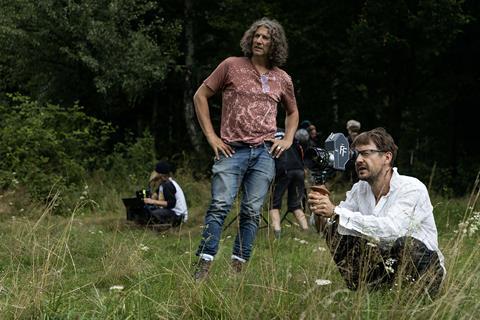
The UK film industry is jubilant following the introduction of the Independent Film Tax Credit (IFTC) today with BFI chief executive Ben Roberts billing it as “the most significant policy intervention since the 1990s” in UK film.
A 53% expenditure credit (equating to a tax relief of approximately 40%) for UK film productions with a budget up to £15m has been introduced, at a time in which the independent film industry has faced a plethora of crippling challenges.
From Oscar-winning directors and producers to up-and-coming filmmakers, the IFTC has been welcomed with unbridled enthusiasm.
“Independent and lower-budget filmmaking is where we had our start and where new voices and innovations vital to the entire industry are born,” said Oppenheimer director-producer duo Christopher Nolan and Emma Thomas. “This enhanced tax relief builds on the incredible work already being done by British filmmakers and will create new opportunities for British crews, filmmakers and cast members for years to come.”
Eon Productions’ Barbara Broccoli described the news as “game changing. It will ensure that our screen industry will continue to thrive by giving opportunities to a diversity of new talent both on and off the screen for future generations of filmmakers.”
Gurinder Chadha, the Bend It Like Beckham filmmaker who gave a passionate off-book speech at a film industry reception at 10 Downing Street in late 2023, followed by oral evidence to the Culture, Media and Sport Committee championing this tax incentive, said: “What today’s momentous news has the power to do is to open the door wider and enable more talented filmmakers with the imagination, creativity and skills to make great films, that not only reflect and contributing to both society and to the success of the wider film industry. Thank you for listening to us.”
Sixteen Films producer Rebecca O’Brien, another figure who gave evidence to the parliamentary committee and has been a vocal proponent of the reform for several years, added: “This hugely welcomed and timely fiscal uplift to support independent film production provides an essential lifeline to our struggling sector. Our indigenous films tell us stories about ourselves and our culture and we’ve been struggling for many years to be able to afford to make them.”
“Independent film is so important for freedom of expression here in the UK,” noted actor and writer Riz Ahmed. “It’s a space where creators have liberty to pursue their artistic vision, to spotlight stories that might otherwise be side-lined, and to showcase new talent from underrepresented groups. It affords us the opportunity to explore different narratives of Britishness. At a time when it’s become increasingly difficult to get independent films financed, this additional support will be vital to ensure the dynamism and influence of British artists on the global stage.”
“True Brit is the only distribution business in the UK exclusively focusing on British films, and whilst we already are in production on four films in under six months since our launch, each film is a patchwork of financiers to get the films greenlit,” observed Zygi Kamasa, True Brit Entertainment founder and chair of the BFI review into independent film in 2018. “One of our British films due to start shooting in May has even been considering shooting the entire film in Malta despite it being set all in Sheffield. We will now reconsider keeping the whole production here in the UK.”

The Zone Of Interest director Jonathan Glazer added: “There’s a risk we are not nurturing the creative filmmakers of tomorrow as it’s increasingly hard to finance films at this budget level in the UK. I welcome the additional support.”
Working Title Films co-chairmen Tim Bevan and Eric Fellner commented: “This lower budget vibrant and creative industry which nurtures and develops often first-time talent is sadly increasingly in crisis, so this additional support targeted directly at the issue is vital in ensuring filmmakers can continue to take risks and produce creatively driven UK films that connect with audiences and showcase crucial parts of our culture.”
“An enhanced UK tax credit is a vital intervention that will allow British producers to boost employment, attract outside investment, and showcase British creativity to audiences on the world stage,” said Love Lies Bleeding and Saint Maud producer Andrea Cornwell. “It will allow stories to be told about ourselves, with the vital resources to make our films more successful creative exports, and hence build a stronger and more stable industry.”
“Expanding tax relief to support UK independent film has never been more needed if this vital part of the industry is to survive and thrive,” said filmmaker Ridley Scott.
“Watching Star Wars as a child, I always assumed blockbuster filmmaking was just a distant dream for someone growing up in the UK,” remembered filmmaker Gareth Edwards, ”But then, as I watched the behind the scenes, I suddenly realised it was all filmed in a studio just outside of London. And that making ambitious commercial films is totally within the reach of British filmmakers. When I finally got to make my first film Monsters, it was made in the true independent style – with a small cast and crew, a tiny budget and shot in just a few weeks. I learnt so much, so fast, and would definitely describe it was one of the most creative experiences I’ve ever had. Without that opportunity I would never have been given Godzilla, Star Wars and The Creator… And now as we organise shooting the new Jurassic Park film in ‘a studio just outside London’, I hope we inspire other new filmmakers to shoot small, but always dream big.”
“British independent films have been one of the great success stories of the last 30 years, from My Beautiful Launderette to All of Us Strangers. Recent failures in the financing model have made them an endangered species, which is depriving British audiences of the chance to see their culture and lives on screen, and losing the opportunity to connect worldwide audiences to Britain, its history and its present,” said The Lady In The Van producer Kevin Loader.
“Increasing the tax credit for culturally British films in the mid-budget range will keep ensure these films continue to be made for today’s generation. Many of us are seriously modelling making our UK-set films in Hungary, Austria or Australia, all of which have more generous tax reliefs in place than the UK – which is where we would most like to be creating jobs and supporting businesses.”
“The creative and economic benefits will be felt through the industry and beyond,” said producer Elizabeth Karlsen of Number 9 Films. “I am delighted and look forward to working many more years in an industry I love.”
“Young filmmakers must have support, encouragement and proper unconditional funding,” affirmed director Mike Leigh. “We must bring through new voices with things to say that are going to change and challenge our views. Having this extra support is going to go a long way to making sure that happens.”
“For the first time in a long time I’m excited about the future of independent film in the UK,” said Neon Films producer Nicky Bentham. “We’ve always had world-class talent and stories to tell and now, thanks to the tireless efforts of Pact over a number of years, alongside brilliant support from the BFI and wider industry, we have the Government’s backing to be truly competitive and achieve our full creative and commercial potential on the global stage.”
Producer Andy Paterson, whose credits include The Railway Man and The Girl With A Pearl Earring, told Screen he was still “a bit stunned” that after seven years of campaigning the government had delivered what he and others had been calling for.
“The budget range is the clearest way of defining what an independent film is,” said Paterson. “We’re very pleased they haven’t put a lower budget limit in as that’s very good for emerging producers.
“We have no problem if Netflix, Searchlight, Amazon, want to make a film in this range but they have to make sure the independent producer [with whom they will be working] sees some benefit.
“It’s great the government has delivered something we can now build on.”
Next generation

For early-career filmmakers working in the low to mid-budget ranges, the IFTC may have the greatest impact.
“There is no way How To Have Sex would have been the film it is without a 40% tax credit in Greece. Currently I am finding it almost impossible to shoot my films in the UK because money goes so much further elsewhere,” said How To Have Sex director Molly Manning Walker.
“Lots of the successful debut films in the last few years have shot out of the UK: Aftersun, How To Have Sex, Earth Mama. It is a shame that I’m constantly looking for stories away from home. I am encouraged by the new support announced today, as I truly believe that when you’re already working with a small budget the extra boost pushes your work into another level.”
“The British film industry is at the forefront of diverse risk-taking cinema,” noted Scrapper director Charlette Regan. “British cinema is unique, its joyful, it’s sad its cinematic. It makes you feel everything. I want to be a part of a world where we’re supporting those voices and forging a world where people with no connection to the industry are allowed to create and be a part of it. The new enhanced tax relief can be a big part of creating that world. It’s what allows small independent producers to tell new interesting stories. It’s what brings work to the industry for local crew. It’s essential.”
“This support means that we are able to sustain an industry that both young and old will be able to call home. It also means we can create a sustainable working environment, keeping thousands in jobs,” noted Boxing Day and Blue Story producer, Joy Gharoro-Akpojotor.
Execs mark the moment

Film4 director Ollie Madden and BBC Film director Eva Yates, who argued the case for additional tax support for independent films during their oral evidence session in front of the CMS Committee, both welcomed the news.
“This is a vital move that will provide a major boost to filmmaking across the country, help grow commercially successful, British-owned intellectual property, and strengthen the foundations of the UK’s vibrant film production sector,” said Madden.
“I hope today’s news will boost confidence in this most creative and dynamic of sectors, and provide some welcome relief for the many independent producers who have worked through unprecedented challenges in recent years to create work of international acclaim,” said Yates.
Tim Davie, director-general of the BBC, also added: “We welcome this additional support and recognition of the cultural and economic importance of supporting stories and talent from across the UK, which is so central to the BBC’s work.”
“This much needed intervention, which really recognises British filmmaking, will enable Film4 to continue to nurture and work with the most distinctive and innovative talent in the UK,” said CEO of Channel 4 Alex Mahon.
“This is a dramatic moment for UK film, and the most significant policy intervention since the 1990s. The positive impact will be felt across our industry, and through all the new films that audiences will get to enjoy. The films we make are vital to our culture expression and creativity – they reflect a diverse and global Britain, and build careers,” added Ben Roberts, BFI CEO.
Jay Hunt, BFI chair, said: “The government’s new tax credit is a game changer for UK filmmakers, creating jobs and ensuring great British stories continue to be told.”
“Today’s announcement of a new tax credit for independent films with budgets up to £15m is a game-changer for our whole sector,” said British Film Commission chief executive Adrian Wootton. ”Limited-budget films are an essential part of a balanced UK production ecosystem. They provide the space to air fresh British voices as well as the seed-bed for a workforce able to move on to major domestic and inward investment productions.”






![The Brightest SunScreen[Courtesy HKIFF]](https://d1nslcd7m2225b.cloudfront.net/Pictures/274x183/3/5/0/1448350_thebrightestsunscreencourtesyhkiff_312678.jpg)


















No comments yet